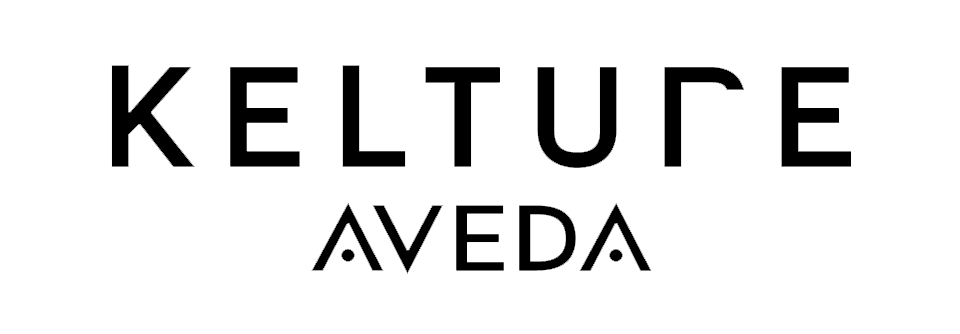Frizzy hair can be a nightmare. It seems to happen out of nowhere, and when it does, it ruins your day and the next few days by making you look disheveled and, frankly, bad. Of course, you can throw on a hat or a hoodie and hide it under your collar, but why go out if that’s what you’re going to do? Maybe you’ll meet someone who will steal your heart, who knows.
If your hair frizzes easily, you’re most likely looking for a way to curb that annoyance. Maybe you have even tried tons of products and treatments and tested every frizz-fighting trick in the book. While some have helped curb the issue, others haven’t or aren’t quite perfect for your specific needs and hair type.
What is Frizzy Hair?
Frizzy hair, also known as a frizz, is a texture of hair that has not been smoothed down by products such as sprays, gels, or serums. Frizzy hair is often caused by damage to the hair shaft or cuticle. This damage can occur through chemical treatments such as straightening or perming and heat damage from blow-drying or flat irons.
The outer layer of your hair is called the cuticle. The cuticles are scales supposed to lay flat against the strands to protect them from damage. When the cuticle is damaged, it becomes rough and uneven and may become raised from the strand in some places and not in others. This causes the strand to catch on other hair strands when it rubs against them and forms knots, leading to frizziness.
What Causes Frizzy Hair?
Frizzy hair is a sign of dryness and damage. And if you have frizzy hair, you may be tempted to blame the weather, but that’s not always the case! Several factors can contribute to frizzy hair, including:
- Not enough moisture
Wet hair is extremely fragile; it’s so delicate that combing or brushing through damp hair can cause breakage and damage. So instead of rushing to get your shampooed hair detangled before blow-drying it, try using a leave-in conditioner to moisturize your strands and reduce frizz.
- Your diet
Just as your skin can become dry from not getting enough water, your hair can also become dry and damaged when you don’t consume enough water. But staying hydrated isn’t the only dietary tip to keep in mind. Try adding more biotin-rich foods like eggs into your diet to help strengthen your strands and minimize breakage.
- The wrong products
There are many different anti-frizz products available that claim to smooth away frizz for sleek hair, but some of these products can weigh down fine or flat hair due to their heaviness.
- Over-cleansing your hair
Washing your hair strips it of essential oils too often, causing it to be dry and brittle. For most people, shampooing every day isn’t necessary. You might want to shampoo twice a week or on alternate days and rinse your hair with water in between.
You are not conditioning your hair enough.
Hair conditioner helps replace lipids and proteins inside the hair shaft and forms a protective layer outside the cuticles to reduce friction between hair strands. This helps eliminate frizz and split ends, which are caused by dryness.
If you have especially dry or frizzy hair, you might want to try using a leave-in conditioner and your regular conditioner after shampoo. A moisturizing mask that you put on your hair for 10 minutes once a week also can help moisturize your locks.
What happens when hair frizzes?
Hair comprises three layers: the medulla, cortex, and cuticle. The medulla is the inner layer of the hair shaft, and the cortex is the middle layer. The cuticle is an outer layer of cells that encase the cortex like shingles on a roof. The cuticle, which has a scale-like structure, is responsible for the smoothness or frizziness of hair.
When you see someone with smooth hair, their cuticles are flat against the cortex. This allows light to pass through and reflect on the scales in one direction, giving them a shiny appearance. Someone with rough or frizzy hair has raised scales that are not lying flat against the cortex; this causes light to reflect on them in different directions, making their hair appear dull and frizzy.
Under normal circumstances, the cuticle layer of your hair lies flat, allowing it to reflect light and appear smooth. When the cuticle layer becomes damaged, it rises away from the shaft and can’t reflect light properly. This makes hair look frizzy.
The outermost layer of your hair is called the cuticle. The cuticle consists of overlapping layers of a protein called keratin that protects the inner parts of the hair shaft. When this layer is smooth and lies flat, it reflects light evenly, and your hair appears shiny and healthy. When damage occurs to the cuticle, it causes gaps in the layers. These gaps make your hair feel rough and dull because light no longer reflects evenly from its surface.
When your hair is damaged, it loses its ability to hold moisture in its outer layers, causing a lack of hydration in the strands. This makes your hair more likely to absorb water from humid air, which causes it to swell up, making it look frizzy.
Hair naturally curly or wavy is more prone to damage than straight hair because curly or wavy locks have a smaller diameter than consecutive locks.
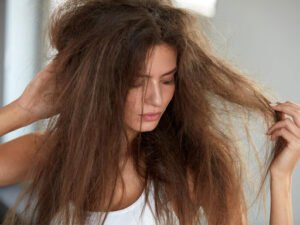
Do some people have naturally frizzy hair?
Yes! It’s not just a matter of humidity. Some people’s hair is naturally frizzy, even if they live in the driest climate on earth.
“Frizz” is more appropriately called “haloing.” It’s when the cuticle layer of your hair lifts and separates, making it look puffy.
Haloing can happen because the cuticle layer is damaged or because you have incredibly porous hair. For instance, if you’ve bleached your hair or heat-styled it frequently, this can make your hair more permeable and, therefore, more likely to a halo.
It’s also common for people with curly or wavy hair to have a halo. This is because their hair tends to be dryer than straight hair and, therefore, more likely to split and separate. Curly and wavy tresses also tend to be porous by nature, making them more susceptible to haloing.
Many women with frizzy hair are often told that they have naturally curly hair, and maybe they just aren’t treating it right. That may be true, but there is a science to prove that some people have frizzier hair than others.
The science behind frizzy hair
Frizzy hair is caused by moisture loss in the hair strand’s outer layer or cuticle. The cuticle is made up of overlapping scales that protect the inner part of the hair strand or cortex. When the cuticle loses moisture, the scales lift and separate from each other, allowing air to pass through. This causes the hairs to swell and look fuzzy.
Your hair will feel dry when your body stops producing oil from your scalp. If you wash your hair too frequently or use products like shampoo and conditioner that strip your scalp of its natural oils, it can make your already dry frizzy hair even frizzier. If you use heat on your hair too much, it can dry out and cause more frizziness.
How to treat frizzy hair?
People with frizzy hair have to deal with a lot of problems. They can’t go out in the rain, they can’t be exposed to high temperatures, and they have to take special care of their hair when drying it. Frizz is a problem that usually affects people with curly hair, but it also affects people who dye their hair regularly.
The lack of moisture causes frizz in your hair, so many people believe that the only way to treat it is by using different types of conditioner that will make their hair look shiny and healthy.
However, there are other things you can do to get rid of frizz once and for all. The first thing you need to do is use a shampoo that will help you get rid of the frizz.
Many different shampoos on the market promise to help you fight against frizz, but most of them don’t work. The best way to find out what works for your hair type is by trying them out yourself and seeing how they work for you.
1. Apple cider vinegar
To get rid of frizzy hair, mix 2 cups of apple cider vinegar and 1 cup of water in a spray bottle. After shampooing your hair, spritz the mixture onto your hair and rinse it with cool water. This will help smooth your hair and make it look less frizzy.
To smooth the ends of your hair, rub some coconut oil into them before showering. Just be sure to comb the oil through your hair when you get out of the shower, so it doesn’t look greasy! If you have dry or color-treated hair, use shea butter instead of coconut oil to moisturize your ends.
If you want to tame frizz naturally, massage some olive or jojoba oil into damp hair, then let it dry. The oil will smooth out any kinks in your hair and make it look less frizzy.
If your hair is particularly dry or damaged, try wrapping a warm towel around it to lock in moisture from the steam after your shower.
To make a deep conditioner for frizzy hair, mix one tablespoon of olive oil and honey with two egg yolks and massage it through damp hair before showering. Leave the mixture on for 15 minutes before rinsing it out with cool water.
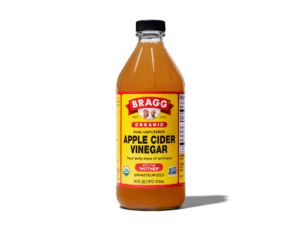
2. Coconut oil
Coconut oil is one of the best natural nutrition for hair. It helps in the healthy growth of hair, providing shine and luster. It promotes scalp health, fighting against problems like insect bites, lice, and dandruff. Coconut oil is typically used for hair care. It also provides the essential proteins required for nourishing damaged hair.
Therefore, it is used as hair care oil and used in manufacturing various conditioners and dandruff relief creams. Coconut oil is usually applied topically for hair care. It provides the essential moisture required by dry hair.
It is time to throw away all those expensive hair care products and switch to coconut oil. This oil has been used in India for centuries as a hair care product. It helps the hair and soothes the scalp, reduces dandruff, and protects from lice.
Coconut oil can be used on dry or wet hair. It does not matter because it moisturizes the hair very well. It makes dry and damaged hair softer and shinier. The best way to use coconut oil is to massage it into your head, let it sit for 15 minutes and then wash it out with shampoo. You can also apply coconut oil to damp hair after you shower, which leaves your hair shiny throughout the day.
You can also use coconut oil for dry, frizzy hair. You have to apply some warm coconut oil to your head, let it sit for 15-20 minutes, depending on how dry your hair is, and then wash it out with shampoo.
Coconut oil is a safe alternative to store-bought products with harsh chemicals that can cause damage over time. And it’s relatively inexpensive compared to other oils like argan or jojoba, which have recently become popular.
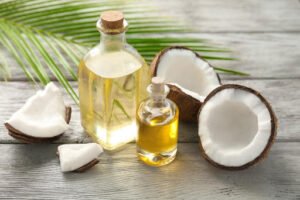
3. Argan oil
Argan oil is extracted from the kernels of the argan tree that grows in Morocco. This oil contains several fatty acids and vitamin E, good for your skin and hair. Argan oil has anti-inflammatory properties, beneficial against many skin problems like eczema, psoriasis, and acne.
The antioxidants present in this oil help protect your cells from damage caused by free radicals. It is also a non-greasy moisturizer for your skin and hair.
To treat frizzy hair, apply a few drops of Argan oil to the hair. You may use this product on wet or dry hair. The best results are usually achieved if you use the oil right after washing your hair.
If you have dehydrated hair and want to bring it back to life (and make it look shiny), try using Argan oil as a leave-in conditioner. After applying it to your hair, let it sit for about 10 minutes before rinsing it out with water.
You can also use Argan oil as a deep conditioning treatment by leaving it in your hair overnight and then washing it out the following day.
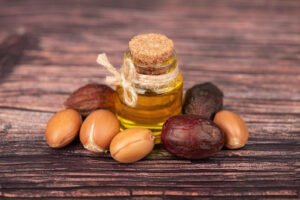
4. Avocado
Avocado is one of the weirdest but most effective ways to treat frizzy hair. Avocado has a high level of natural oils that can easily penetrate your hair, keeping it moisturized and protected from frizz.
Avocado does not only make your hair shiny, but it also provides essential nutrients that can help prevent and treat frizzy hair. Avocado is an excellent source of vitamin B and E and contains fatty acids that moisturize your scalp and keep your hair luscious.
To use avocado for frizzy hair:
- Cut an avocado in half and scoop out the flesh (you can save the skin and pit for a face mask!).
- Mash it with a fork until lump-free, then massage into your scalp and comb through to the ends.
- Leave for 15 minutes before rinsing thoroughly — any longer, and you run the risk of your hair looking greasy.
Avocado makes an excellent hair mask because it’s loaded with fatty acids, vitamin E, and antioxidants which are super beneficial for your hair health. Plus, if you’re struggling with dry scalp or dandruff, avocado can help by soothing inflammation and restoring moisture to the scalp.
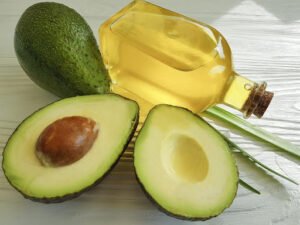
5. Egg
An egg is a great product to use as an at-home treatment for frizzy hair.
If you have frizzy hair and would like to tame it, try using an egg. The egg is a protein-rich food that moisturizes your hair, making it smooth and shiny.
It is also very easy to use: mix one or two eggs with other ingredients and apply them to your scalp. You can use this mask for about 30 minutes before washing it off.
An egg is beneficial for your hair and has many other health benefits. It contains all nine essential amino acids needed by our body to function correctly. These include lysine, threonine, methionine, cysteine, etc.
Eggs are also high in protein and low in fat, so they make an excellent source of nutrients without adding too many calories to your diet!

Conclusion
If you’re one of the many women who battle frizzy hair in Singapore, we understand your frustration. Your hair transforms from smooth and silky to a frizz ball with a little bit of humidity.
Although frizzy hair is not an uncommon problem in Singapore, the good news is that there are many different ways to tame those flyaways and treat your frizzy hair professionally.
Whether you choose to get a keratin treatment or a haircut to reduce frizz, Kelture Aveda Hair Salon can help you achieve smooth hair with less wavy, frizzy ends.
Curly hair is naturally more prone to frizz than straight hair. This is because curly hair has a more porous cuticle (its outer layer), and it lacks the natural elasticity of straight hair, so it’s more vulnerable to humidity.
You should treat your frizzy hair professionally in Singapore at Kelture Aveda Hair Salon if you have curly or wavy hair. Kelture Aveda Hair Salon in Singapore offers professional anti-frizz treatments that are gentle on your hair and last longer than any drugstore product.
If your curly or wavy locks are prone to frizz, there are several steps you can take to prevent your hair from becoming a wild bush! These tips will help you treat your frizzy hair professionally.
